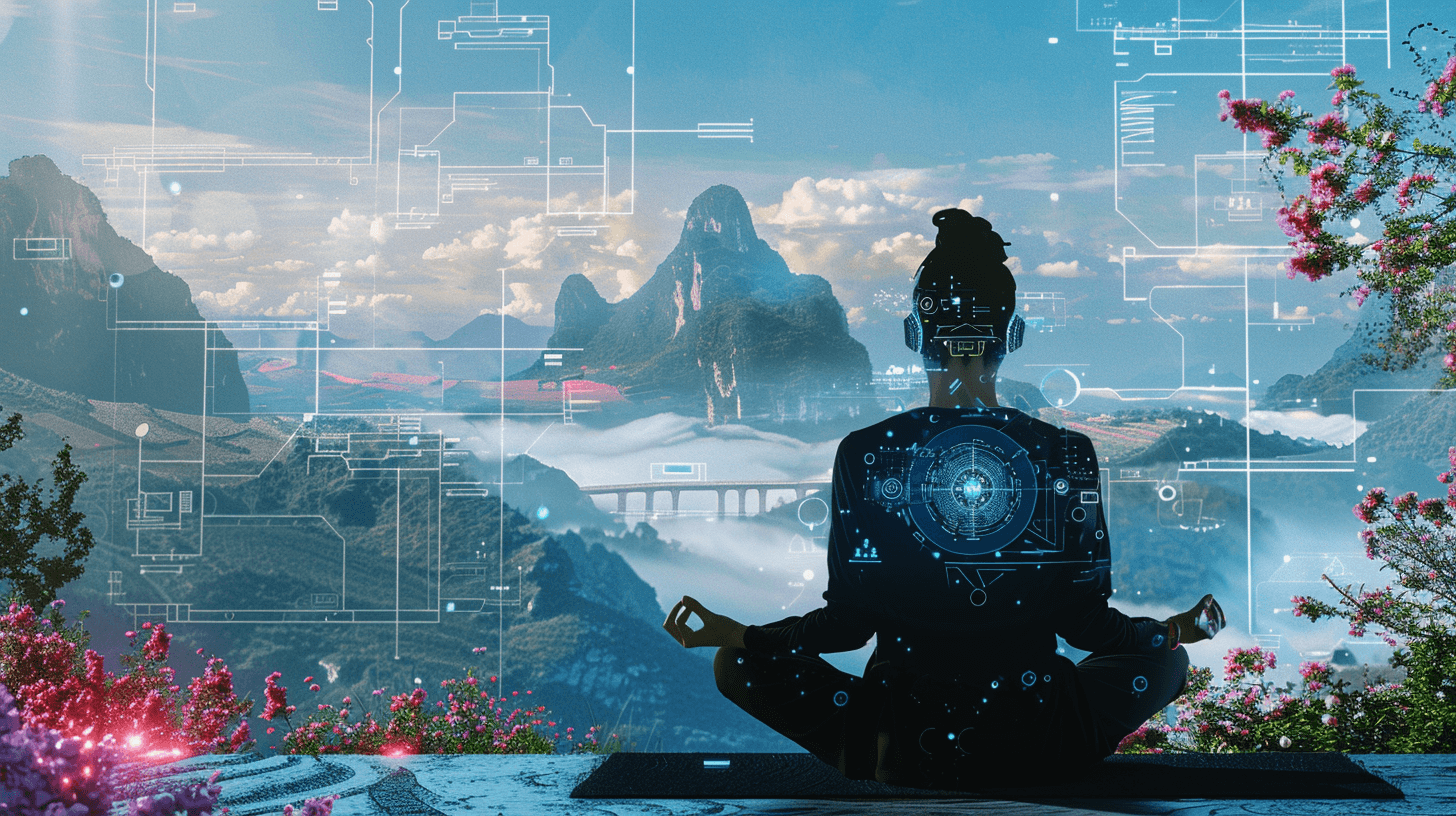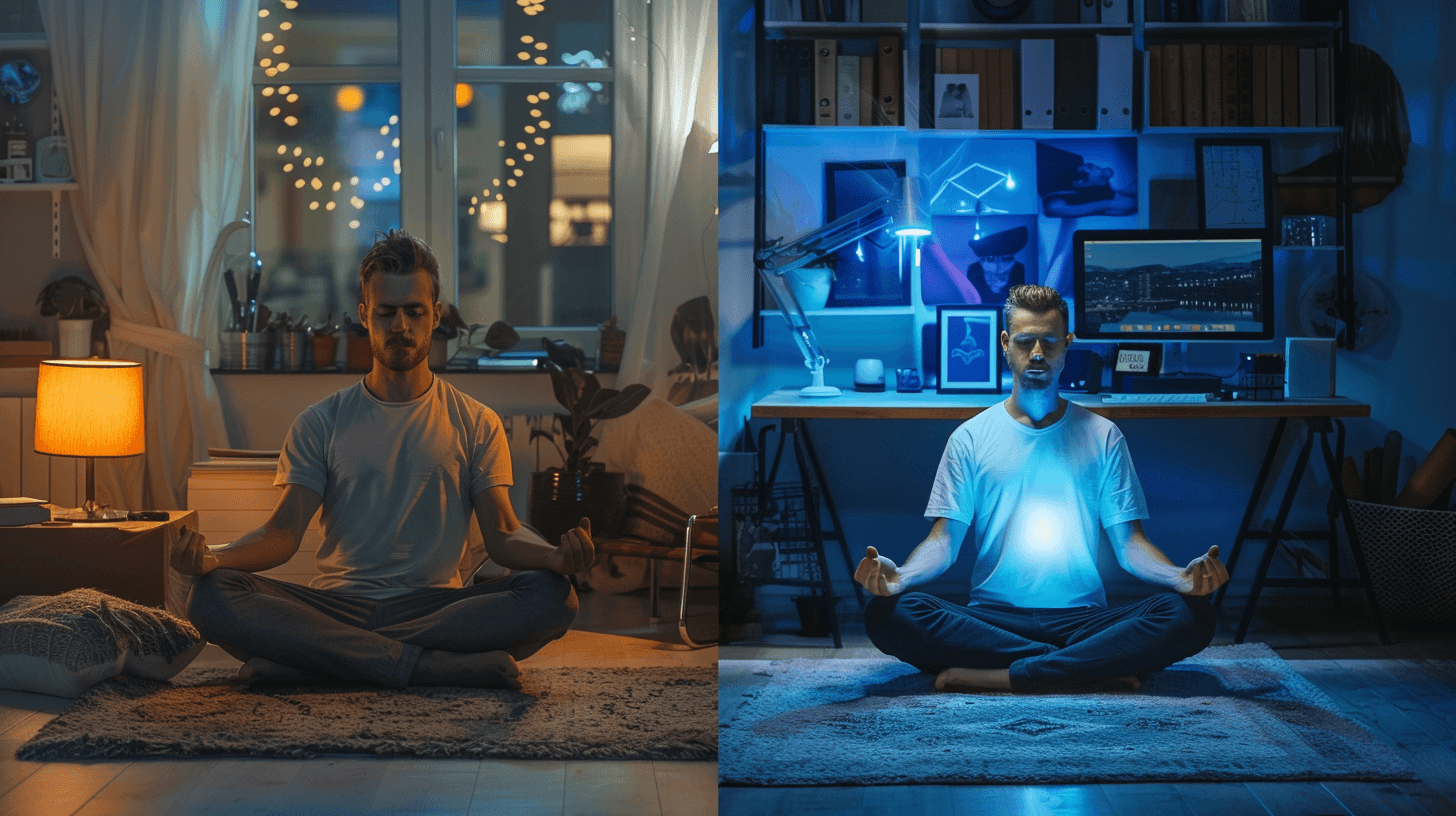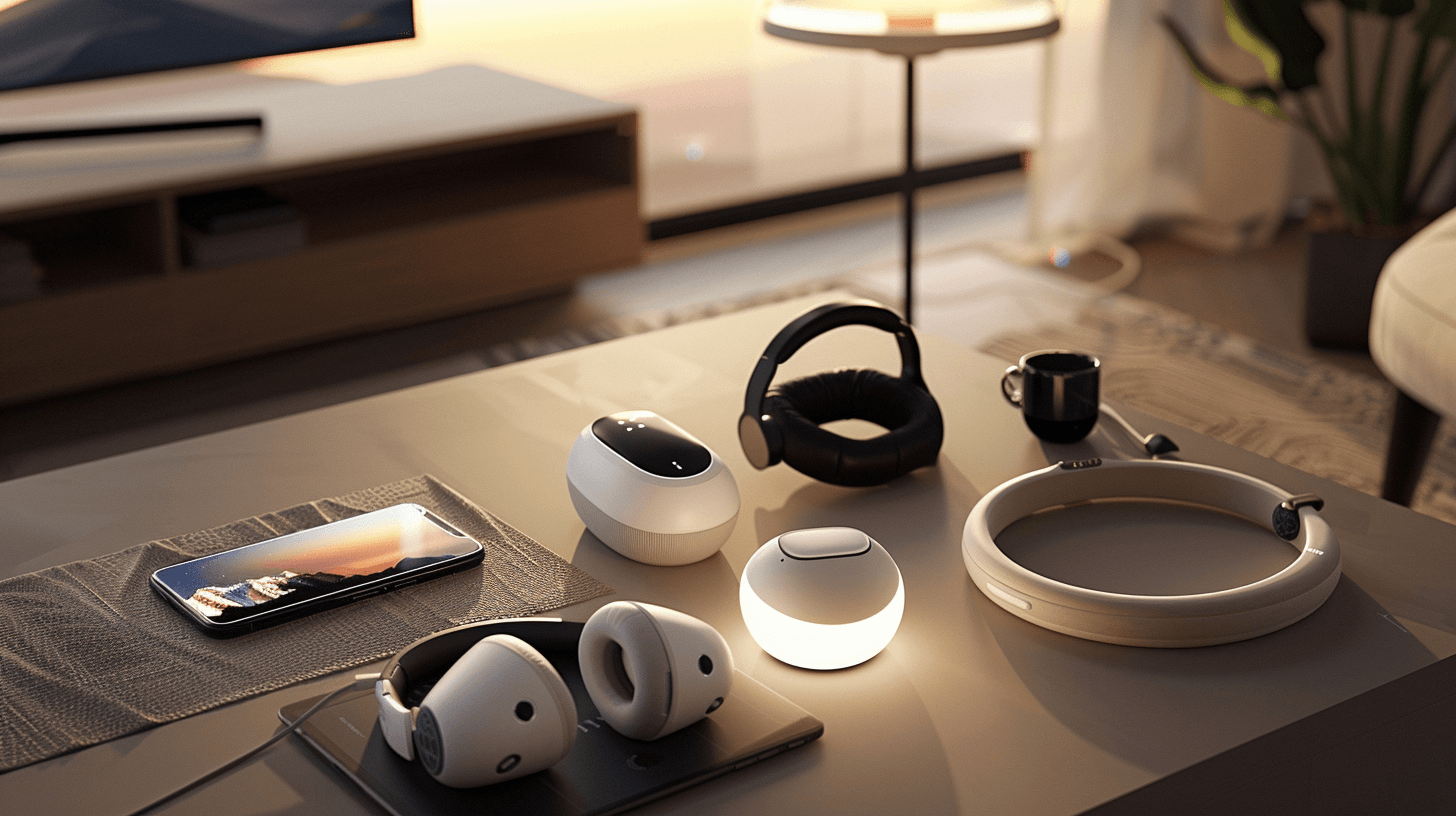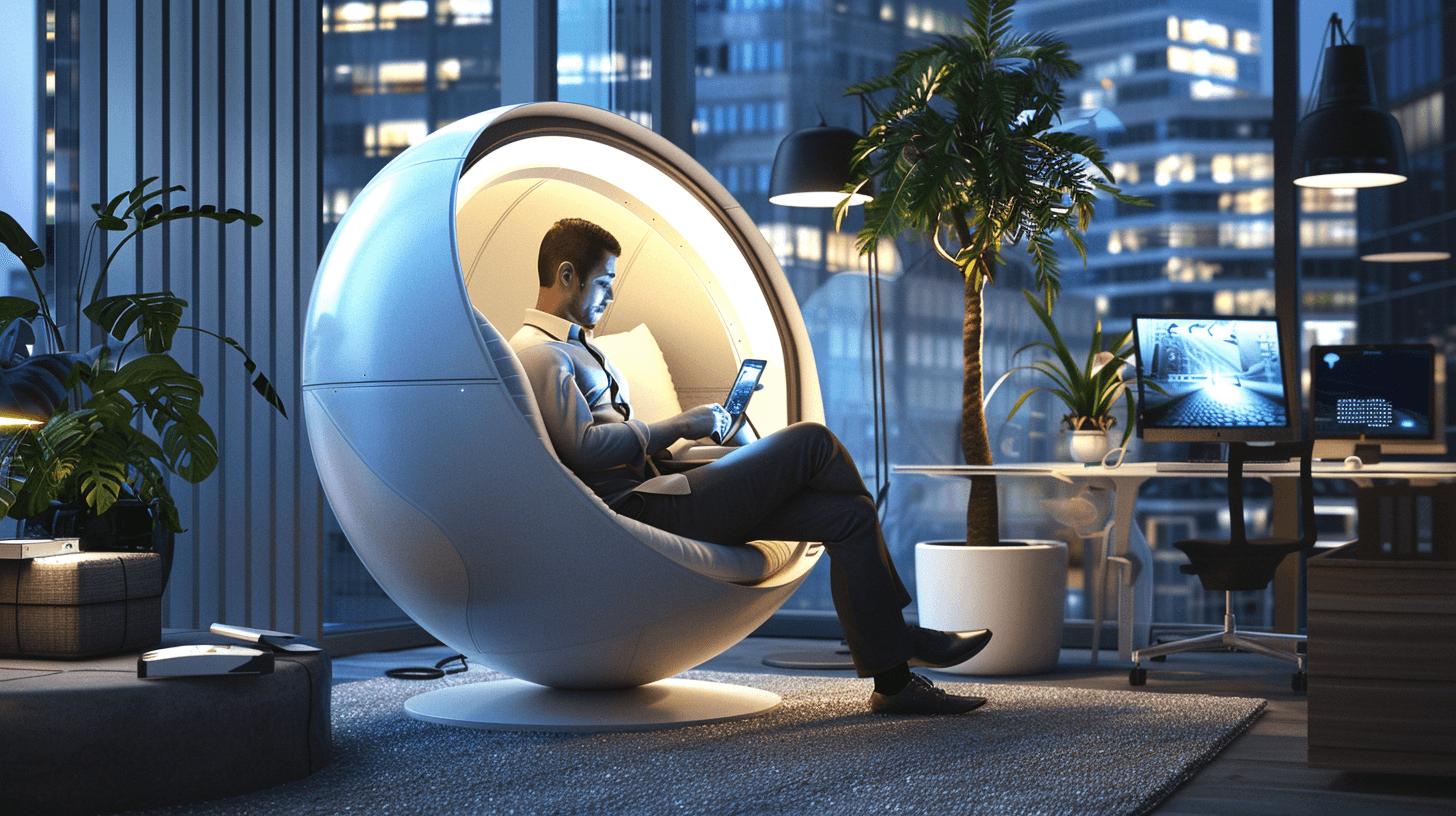Introduction

Visualize stepping into a world where your mind’s tranquility is seamlessly enhanced by the quiet intelligence of technology. What if every meditative session you embarked on was perfectly tailored to your emotional state and mental needs at that moment? This is no longer a scenario of futuristic fiction. Today, artificial intelligence is merging with traditional meditation practices to revolutionize mental wellness, offering personalized experiences that were once the stuff of dreams.
Artificial intelligence in meditation is transforming the landscape of mental health with smart, adaptive technologies that personalize and elevate meditation experiences. These AI-driven tools analyze your mood, stress levels, and even your environment to deliver customized meditation guidance that resonates deeply and effectively with your personal wellbeing needs. From apps that suggest meditation techniques based on your current mental state to wearables that track your biometrics and adjust your meditation settings accordingly, AI is making it easier than ever to achieve profound peace and mindfulness.
In this article, we will explore the diverse range of AI technologies in meditation, delving into their myriad benefits and the profound impact they can have on our daily lives. We will also provide practical advice on how to integrate these cutting-edge innovations into your routine to enhance your mental health and overall mindfulness. Prepare to discover how AI is not just augmenting meditation—it’s redefining it, promising a future where mental wellness is accessible, personalized, and profoundly effective
Understanding AI in Meditation

Artificial intelligence (AI) in meditation is a groundbreaking fusion of technology and ancient relaxation techniques, transforming the way we approach mental wellness. To understand the role of AI in meditation, it’s essential to grasp some fundamental concepts. AI, at its core, involves the use of machine learning, algorithms, and data processing to mimic human intelligence. In the context of meditation, AI uses these capabilities to analyze user data—such as stress levels, mood, and even heart rate—to offer personalized meditation guidance.
Historically, meditation practices have always embraced technological advancements to enhance the meditative experience. From the simple timers used in the late 20th century to the sophisticated apps of the early 2000s, technology has progressively enabled more people to practice meditation effectively, regardless of their busy schedules or lack of traditional guidance. The integration of AI into meditation is the latest significant milestone, representing a leap towards highly personalized mental health care. AI doesn’t just time sessions or play generic background sounds; it learns from each session, adjusting parameters to better suit the needs of the user, making every meditation session more effective than the last.
Today, AI-powered meditation tools come in various forms, each offering unique features and benefits. Meditation apps like Headspace and Calm use algorithms to tailor meditation sessions based on user feedback, adjusting factors such as session length, focus area, and guidance style. These apps are incredibly accessible and convenient, allowing users to meditate anytime and anywhere, just with a smartphone at hand.
Wearable devices, such as the Muse headband, take a more biometric approach. Muse monitors brain activity during meditation and provides real-time feedback via auditory cues to help the user find a state of calm. This direct feedback loop enhances the learning process, making meditation not just a habit but an evolving practice of self-improvement.
Virtual reality (VR) solutions offer the most immersive experience. Platforms like TRIPP use VR to transport users to calming environments, which can be particularly useful for those who find traditional meditation challenging. These VR experiences are designed not just to guide meditation but to enhance it by engaging multiple senses, which can significantly deepen the meditative state.
Each type of AI meditation tool brings something unique to the table, and understanding these options allows users to choose the best tool for their needs. The AI-driven personalization in meditation is not just about convenience; it’s about creating a deeply personal and adaptive practice that can grow and evolve with the user, catering to their mental health needs with increasing precision. This landscape of AI-driven meditation tools promises a future where everyone can achieve mindfulness and improved mental health through technology.
Benefits of AI-Powered Meditation

Artificial intelligence is revolutionizing the personal meditation experience, making it more adaptive, accessible, and aligned with individual needs than ever before. The core benefits of AI in meditation—personalization, consistency and motivation, enhanced learning, and accessibility—are transforming how individuals engage with this ancient practice.
Personalization is at the forefront of AI-powered meditation. By utilizing algorithms and data analytics, AI technologies can tailor meditation sessions to individual psychological and physiological profiles. For instance, based on input data such as current mood, stress levels, and personal preferences, AI can suggest specific meditation types—from calming breath-focused sessions to energizing guided visualizations. This level of customization ensures that each session is optimally effective, addressing the user’s needs at that moment, making meditation not just a routine, but a personally tuned mental health practice.
Moving to Consistency and Motivation, AI plays an essential role. Many individuals struggle to maintain a regular meditation schedule, but AI can help by setting reminders and tracking progress. More sophisticated systems even incorporate gamified elements or positive reinforcement techniques, such as earning badges for consecutive days of meditation or reaching new levels of mindfulness, thus encouraging users to stick to their meditation goals. This consistent engagement helps users build and maintain a meditation habit that can lead to significant improvements in their overall mental health.
Enhanced Learning through AI is another pivotal benefit. AI-powered tools provide users with feedback loops that offer real-time adjustments and advice during meditation sessions. For example, if a user’s mind is wandering frequently, the AI might suggest focusing techniques or modify the session’s background sounds to increase concentration. This immediate feedback helps users understand and master various meditation techniques more effectively, speeding up their learning curve and deepening the meditation experience.
Accessibility is perhaps one of the most inclusive benefits of AI in meditation. With features like voice-guided meditations and adjustable settings for different abilities, AI makes meditation more accessible to people with busy schedules or physical disabilities. AI-driven meditation tools are available on multiple platforms, from smartphones and tablets to smart watches, ensuring that everyone can find a convenient way to practice meditation regardless of their lifestyle or mobility constraints.
Choosing the Right AI Meditation Tool

When venturing into the world of AI-powered meditation, selecting the right tool is pivotal. The right AI meditation tool not only enhances your daily practice but also ensures it aligns with your personal goals and lifestyle. Here are the key criteria to consider:
Interactivity: This refers to how the tool engages with you during meditation sessions. A good AI meditation tool should offer a responsive interface that adapts to your feedback during sessions. This could be adjusting the meditation path based on your current stress level or mood, gauged via physiological feedback or self-reported mood states.
Feedback Mechanisms: Effective feedback during meditation can drastically improve the quality of each session. Look for tools that provide real-time adjustments, such as changing audio tones when you’re distracted or offering verbal cues to enhance relaxation. This immediate feedback helps deepen the meditation experience and makes the learning curve less steep.
Data Privacy: With personal data being a major concern today, ensure that any AI tool you consider has robust privacy policies in place. Understand how your data will be used, stored, and protected. A trustworthy provider should be transparent about their data handling practices and comply with relevant data protection regulations.
Top-Rated AI Meditation Apps and Devices
As you consider these criteria, here are some top-rated AI meditation tools currently available on the market:
Headspace: Known for its user-friendly interface, Headspace uses data you provide to personalize meditation sessions. It offers guided meditations based on your mood and goals and provides progress tracking to keep you motivated. More about Headspace
Calm: This app is celebrated for its effectiveness in reducing anxiety and improving sleep. Calm offers tailored meditation experiences and utilizes user feedback to enhance future sessions. It’s also known for its strong commitment to data privacy. Explore Calm
Muse: A wearable device that measures brain activity to provide live feedback during meditation. Muse enhances learning by showing you when you’re focused and when your mind is wandering. The device is highly interactive and offers a unique approach to meditation. Learn more about Muse
Synctuition: An app that stands out for its immersive 3D audio meditations, which use binaural beats to enhance relaxation. It personalizes experiences based on user feedback and ensures high standards of data privacy. Discover Synctuition
Integrating AI Meditation into Daily Life

Incorporating AI meditation tools into your daily routine can be a seamless and highly rewarding endeavor. Here are practical tips on how to make the most of these innovative tools across different parts of your day:
Morning Routine: Start your day centered and calm by scheduling a short meditation session right after you wake up. AI tools can suggest types of meditation based on your current mood and sleep quality, setting a positive tone for the rest of your day.
Stress Relief During Work: Utilize AI meditation apps during your breaks to manage and mitigate work-related stress. Even a brief 5 to 10-minute session can reset your mental state and boost productivity. AI functionalities can remind you to take breaks and provide quick meditation guides tailored to your stress levels and time constraints.
Unwinding Before Bed: End your day with a relaxation-focused meditation to improve sleep quality. AI tools can analyze your activity and stress levels throughout the day and recommend the most effective techniques to ensure a restful night.
Real-Life Success Stories
Sarah, Marketing Manager: Sarah has expressed that using the Omful app has significantly transformed her meditation practice. The app’s AI-generated voices, expertly-crafted exercises, and binaural beats have made her meditation more immersive and effective, helping her to feel more relaxed and focused (Omful | AI-Powered Guided Meditations).
James, Entrepreneur: Initially skeptical about meditation apps, James found the personalized voice options and well-designed mindfulness exercises provided by Omful to be a game changer in his daily routine, helping him to find calm amidst his hectic entrepreneurial life (Omful | AI-Powered Guided Meditations).
David Hoffi: David shared his positive experiences with the Ogimi app, highlighting its unique, personalized guided meditations. He appreciated the natural voices and the app’s ability to adapt meditation techniques to his mood and needs, enhancing his daily meditation practice (Apple).
These examples illustrate how AI meditation apps can cater to diverse user needs, making meditation more accessible and tailored to individual lifestyles. For more detailed insights into these tools and to explore more user experiences, you might consider looking into their respective websites and user reviews on platforms like Omful and Ogimi.
Transforming Therapy: Mariam Khayretdinova Unveils AI's Impact on Mental Health at TEDxBoston
Future of Meditation and AI

The intersection of artificial intelligence and meditation is evolving rapidly, with emerging technologies pushing the boundaries of how we experience mindfulness. The early days of simple guided meditation apps have given way to more sophisticated AI-driven tools, utilizing neurofeedback and augmented reality to deepen the immersion and effectiveness of meditation practices. Innovations such as biometric feedback now allow these tools to tailor meditation experiences in real-time, adjusting sessions based on physiological responses like heart rate and brain activity to enhance relaxation and focus.
The evolution of these technologies is supported by insights from both tech innovators and meditation gurus, who envisage a seamless integration of AI with traditional meditation practices. These experts predict that AI will continue to personalize meditation to individual emotional and psychological states, making the practices more accessible and effective. This could include adaptive learning environments where meditation sessions evolve in response to the emotional and mental states of the user, ensuring optimal outcomes.
Looking forward, the potential societal impacts of AI-driven meditation are vast. As these tools become more accessible, their integration into healthcare, workplace wellness, and daily stress management could democratize mental health support. The ability of AI to provide personalized, effective meditation guidance could make mental health care more equitable, extending high-quality meditation resources to anyone with a smartphone or internet access.
This vision for the future is not just about technology; it’s about creating a more mindful, less stressed society. By leveraging AI, meditation can become a tool that is not only about personal growth but also about societal well-being, potentially transforming how we manage mental health in a connected world.
Conclusion: The Transformative Power of AI in Meditation

As we’ve explored throughout this article, artificial intelligence is revolutionizing the field of meditation, enhancing traditional practices with cutting-edge technology that caters to the individual needs of users across the globe. AI has significantly improved the personalization, consistency, and accessibility of meditation, allowing for experiences that are deeply tailored to each individual’s psychological and emotional states.
AI-driven tools in meditation offer an array of personalized options, from apps that adapt in real time to your mood and stress levels, to wearables that guide your sessions through physiological feedback. This level of customization ensures that meditation is not only more effective but also more engaging, helping individuals from diverse backgrounds integrate mindfulness seamlessly into their busy lives.
Call to Action: Now, it’s your turn to experience the benefits of AI-powered meditation tools. I encourage you to explore various AI meditation apps and devices to discover the one that best aligns with your personal goals and lifestyle. Whether you are a seasoned meditator or just beginning your journey, there is an AI tool that can enhance your practice. Additionally, stay informed about the latest advancements in AI and wellness technology by signing up for our newsletter or following our updates. This way, you can continue to stay at the forefront of this exciting intersection of technology and personal well-being.
AI’s potential to democratize access to effective mental health tools promises to expand the impact of meditation on overall well-being significantly. By integrating these innovative tools into your daily routine, you contribute not only to your personal health but also to the broader community, fostering a culture of mindfulness that is accessible to all.
Embrace the future of meditation with AI, and take a step towards a more mindful, focused, and serene life. Your journey towards enhanced mental health and wellness supported by artificial intelligence starts today.







